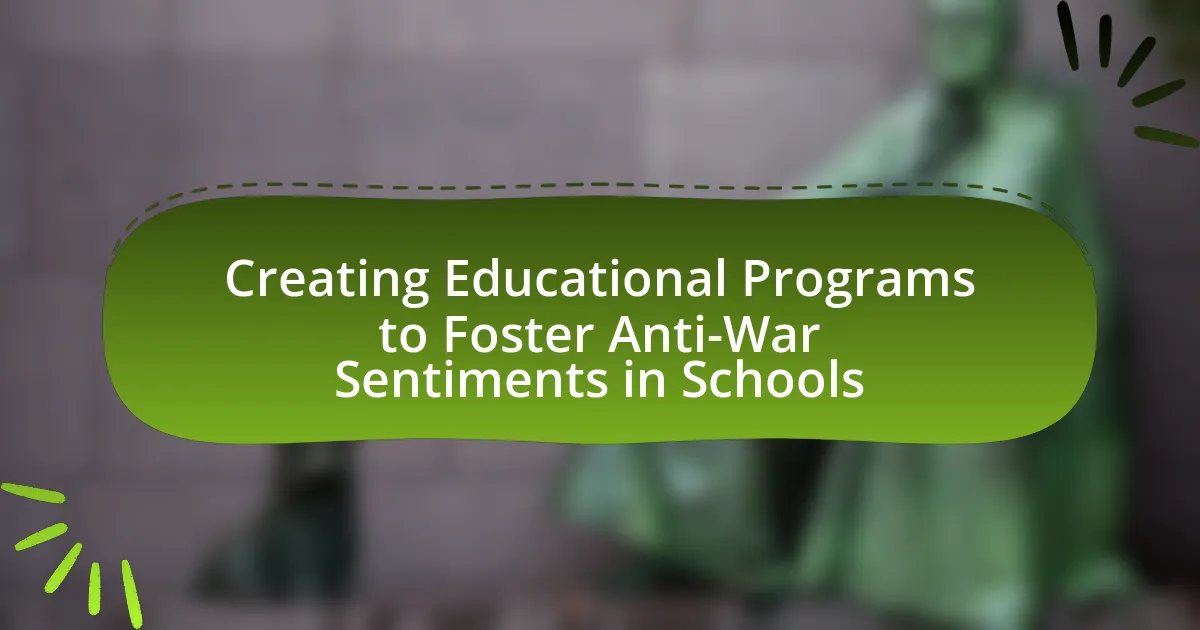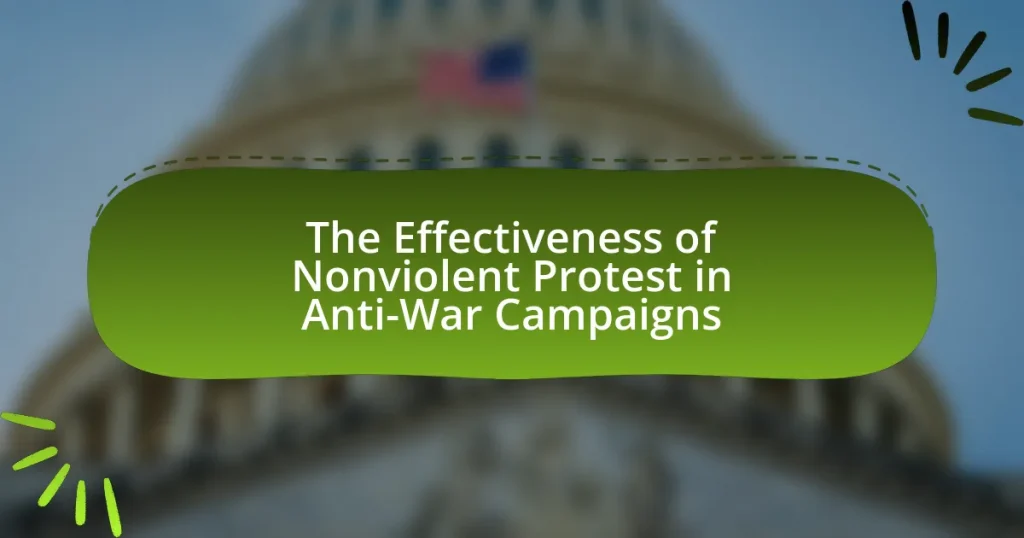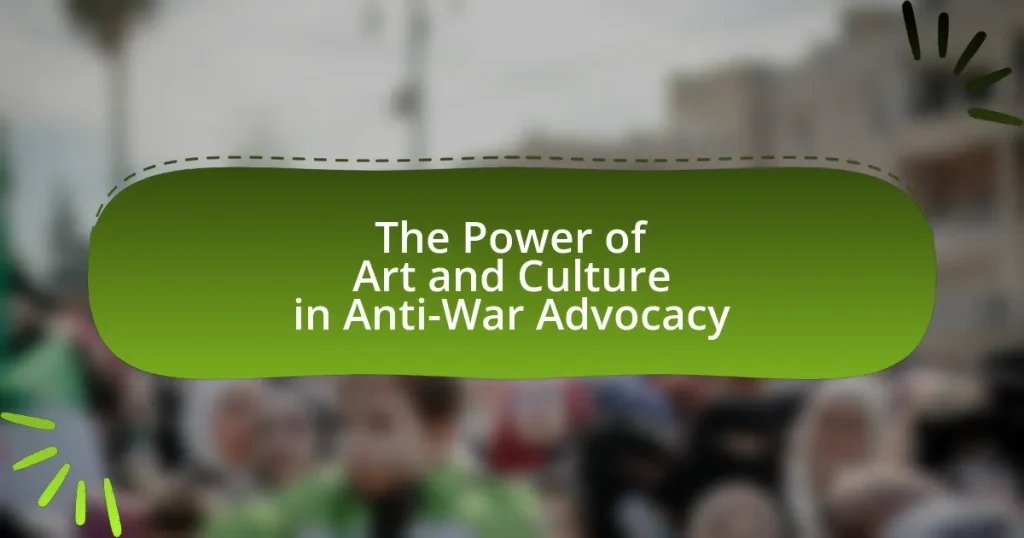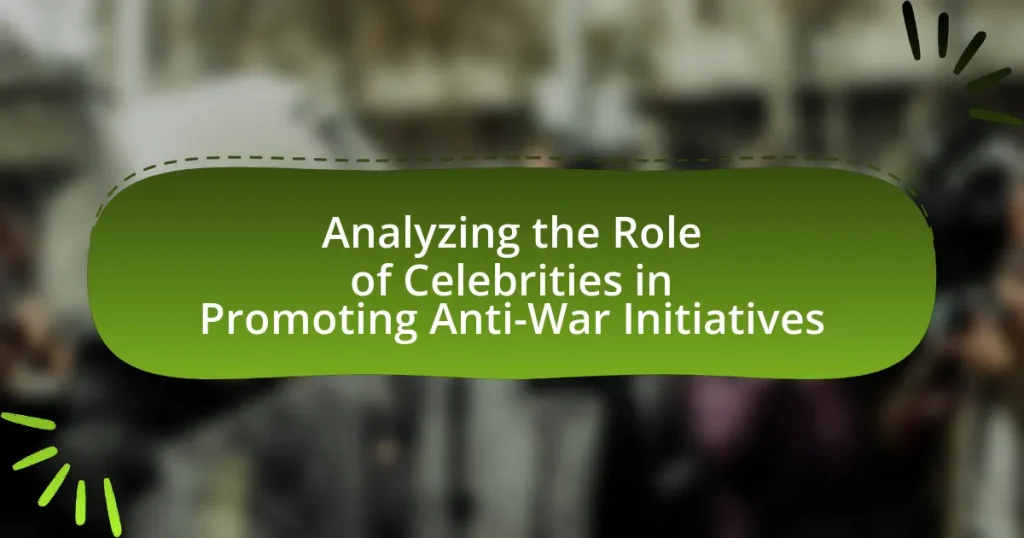The article focuses on creating educational programs to foster anti-war sentiments in schools, emphasizing the importance of peace education, conflict resolution, and historical analysis of war impacts. It outlines various methodologies, such as experiential learning and critical pedagogy, that enhance student engagement and understanding of war-related issues. Key themes addressed include the consequences of war, the significance of peace, and the promotion of human rights, all aimed at shaping students’ perspectives and encouraging active citizenship. The article also discusses the challenges educators face in implementing these programs and highlights the long-term benefits of fostering anti-war sentiments for a more peaceful society.
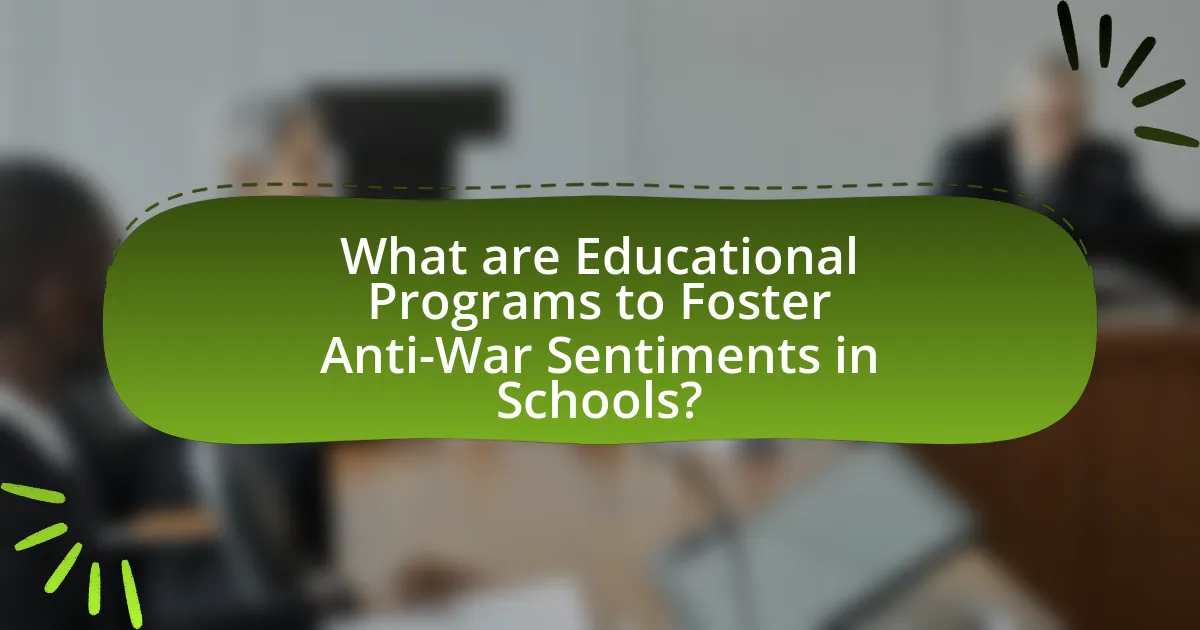
What are Educational Programs to Foster Anti-War Sentiments in Schools?
Educational programs to foster anti-war sentiments in schools include peace education curricula, conflict resolution workshops, and historical analysis of war impacts. Peace education curricula, such as those developed by organizations like the Peace Education Foundation, aim to teach students about non-violence, empathy, and the consequences of war. Conflict resolution workshops provide students with skills to manage disputes peacefully, promoting understanding and cooperation. Historical analysis programs encourage students to critically examine the causes and effects of wars, fostering a deeper understanding of the importance of peace. These programs are supported by research indicating that early exposure to anti-war education can lead to more peaceful attitudes and behaviors in adulthood.
How do these programs aim to influence student perspectives on war?
These programs aim to influence student perspectives on war by providing critical education that emphasizes the consequences of conflict and promotes peacebuilding. Through interactive curricula, students engage with historical case studies, analyze the impact of war on societies, and participate in discussions that challenge militaristic narratives. For instance, programs often incorporate testimonials from war survivors and veterans, which humanize the effects of war and foster empathy. Research indicates that educational interventions focused on peace and conflict resolution can significantly shift students’ attitudes towards non-violence, as evidenced by studies showing increased awareness and advocacy for peace initiatives among participants.
What key themes are addressed in anti-war educational programs?
Anti-war educational programs address key themes such as the consequences of war, the importance of peace, conflict resolution, and the promotion of human rights. These programs emphasize the devastating impacts of war on individuals and societies, highlighting historical examples like World War II and the Vietnam War to illustrate the human cost. They also focus on teaching students about non-violent methods of conflict resolution, encouraging dialogue and understanding as alternatives to violence. Furthermore, these programs advocate for human rights by educating students about global issues, fostering empathy, and promoting active citizenship to prevent future conflicts.
How do these themes resonate with students’ experiences?
The themes of anti-war sentiments resonate with students’ experiences by reflecting their concerns about conflict, peace, and social justice. Many students are directly affected by the consequences of war, whether through family members in the military or through exposure to global conflicts in media. Research indicates that educational programs addressing these themes can enhance students’ critical thinking and empathy, as they engage with real-world issues. For instance, a study by the American Psychological Association found that discussions around war and peace in educational settings lead to increased awareness and activism among youth, demonstrating the relevance of these themes to their lives.
Why is it important to foster anti-war sentiments in educational settings?
Fostering anti-war sentiments in educational settings is crucial for promoting peace and critical thinking among students. Educational environments shape the values and beliefs of future generations, and instilling anti-war sentiments encourages students to question the justifications for conflict and consider the consequences of war. Research indicates that exposure to peace education can lead to a decrease in aggressive behaviors and an increase in empathy among students, as shown in studies conducted by the International Institute for Peace Education. By integrating anti-war perspectives into curricula, educators can cultivate a culture of dialogue and understanding, ultimately contributing to a more peaceful society.
What historical contexts support the need for anti-war education?
The historical contexts that support the need for anti-war education include the aftermath of World War I, the Vietnam War, and the Cold War. The devastation and loss of life during World War I led to a widespread desire for peace, exemplified by the establishment of the League of Nations, which aimed to prevent future conflicts. The Vietnam War, characterized by significant public opposition and protests, highlighted the moral and ethical implications of military engagement, prompting educators to address the consequences of war in curricula. Additionally, the Cold War era, marked by nuclear threats and ideological battles, underscored the importance of promoting peace and conflict resolution in educational settings to prevent escalation into global warfare. These historical events collectively illustrate the necessity for anti-war education to foster critical thinking about the implications of war and to promote peaceful alternatives.
How can anti-war sentiments contribute to a peaceful society?
Anti-war sentiments contribute to a peaceful society by promoting dialogue, understanding, and conflict resolution over violence. When individuals and communities embrace anti-war perspectives, they are more likely to engage in discussions that address the root causes of conflict, fostering empathy and cooperation. Research indicates that societies with strong anti-war movements often experience lower levels of militarization and violence; for instance, countries with active peace organizations tend to prioritize diplomatic solutions over military interventions. This shift in focus can lead to more stable and harmonious communities, as seen in nations that have successfully implemented peace education programs in schools, which cultivate critical thinking and conflict resolution skills among students.
What challenges do educators face in implementing these programs?
Educators face several challenges in implementing programs designed to foster anti-war sentiments in schools. One significant challenge is the lack of resources, including funding and training, which can hinder the development and execution of effective curricula. According to a report by the National Education Association, 60% of teachers feel they do not have adequate resources to teach controversial topics, including war and peace. Additionally, educators often encounter resistance from parents and community members who may hold differing views on war, leading to potential conflicts and pushback against the programs. Furthermore, educators must navigate the complexities of age-appropriate content, ensuring that discussions about war are suitable for their students’ developmental levels. These challenges collectively impact the successful implementation of anti-war educational initiatives in schools.
What resistance might educators encounter from stakeholders?
Educators might encounter resistance from stakeholders such as parents, school boards, and community members when implementing educational programs that foster anti-war sentiments. This resistance often stems from differing political beliefs, concerns about indoctrination, and the perception that such programs may undermine national values or patriotism. For instance, a survey conducted by the Pew Research Center in 2021 indicated that 60% of parents expressed concern about schools teaching controversial political topics, which can include anti-war perspectives. Additionally, school boards may face pressure from community members who advocate for a more traditional curriculum that aligns with their views on national identity and military service.
How can educators overcome these challenges effectively?
Educators can effectively overcome challenges in creating educational programs to foster anti-war sentiments by implementing collaborative teaching strategies and integrating diverse perspectives into the curriculum. Collaborative teaching allows educators to share resources and expertise, enhancing the quality of discussions around war and peace. For instance, incorporating literature, history, and social studies can provide students with a multifaceted understanding of the consequences of war. Research indicates that programs emphasizing critical thinking and empathy significantly improve students’ engagement and understanding of complex issues, as shown in studies by the American Educational Research Association. By fostering an inclusive environment that encourages dialogue and critical analysis, educators can effectively address the challenges associated with teaching anti-war sentiments.
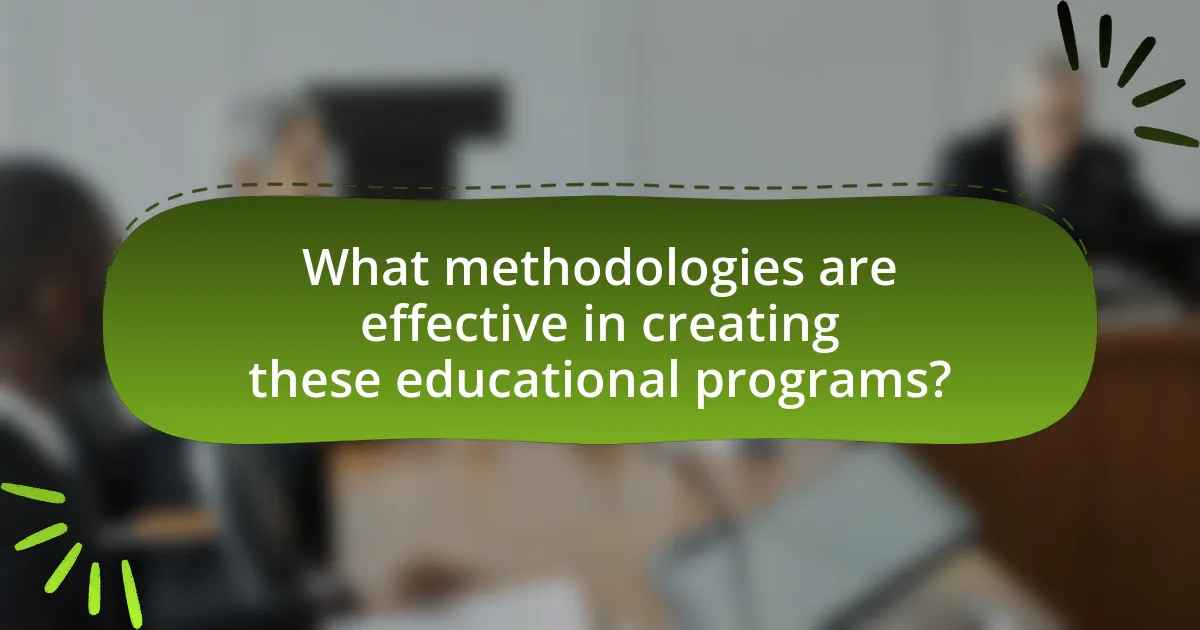
What methodologies are effective in creating these educational programs?
Effective methodologies for creating educational programs that foster anti-war sentiments in schools include experiential learning, critical pedagogy, and collaborative learning. Experiential learning engages students through direct experience, allowing them to reflect on the consequences of war and peace. Critical pedagogy encourages students to question societal norms and develop a critical consciousness about war-related issues. Collaborative learning promotes teamwork and dialogue among students, fostering a shared understanding of the impacts of war. Research indicates that these methodologies enhance student engagement and promote deeper understanding of complex social issues, as evidenced by studies showing improved critical thinking skills and empathy in students exposed to such educational frameworks.
How can experiential learning be integrated into anti-war education?
Experiential learning can be integrated into anti-war education by incorporating hands-on activities that promote critical thinking and empathy regarding the consequences of war. For instance, role-playing simulations can allow students to experience the perspectives of various stakeholders affected by conflict, fostering a deeper understanding of the human impact of war. Research by the National Council for the Social Studies highlights that experiential learning enhances engagement and retention of complex social issues, making it an effective method for teaching anti-war principles. Additionally, community service projects that support war-affected populations can provide students with real-world contexts to apply their learning and develop a sense of social responsibility.
What types of activities promote engagement and understanding?
Interactive discussions and collaborative projects promote engagement and understanding in educational programs. These activities encourage students to actively participate, share diverse perspectives, and work together towards common goals. Research indicates that group discussions enhance critical thinking and empathy, as students learn to articulate their views while considering others’ opinions. Additionally, hands-on projects, such as simulations or role-playing exercises, allow students to experience real-world scenarios, deepening their comprehension of complex issues like war and peace. Studies show that experiential learning significantly increases retention and understanding, making these activities effective in fostering anti-war sentiments.
How can field trips and community involvement enhance learning?
Field trips and community involvement enhance learning by providing experiential opportunities that deepen understanding and engagement with educational content. These activities allow students to connect theoretical knowledge with real-world applications, fostering critical thinking and retention. Research indicates that students who participate in field trips demonstrate improved academic performance and greater enthusiasm for learning, as evidenced by a study published in the Journal of Educational Psychology, which found that experiential learning can lead to a 20% increase in retention rates compared to traditional classroom instruction. Additionally, community involvement cultivates social responsibility and empathy, essential components in fostering anti-war sentiments, as students engage with diverse perspectives and learn the importance of civic engagement.
What role does critical thinking play in anti-war educational programs?
Critical thinking plays a crucial role in anti-war educational programs by enabling students to analyze and evaluate the complexities of war and peace. This analytical skill encourages learners to question prevailing narratives, assess the consequences of military actions, and understand the socio-political contexts that lead to conflict. Research indicates that programs incorporating critical thinking foster greater empathy and awareness among students, allowing them to engage in informed discussions about the ethical implications of war. For instance, a study by the American Psychological Association highlights that critical thinking in educational settings enhances students’ ability to recognize biases in media portrayals of war, ultimately promoting a more nuanced understanding of global issues.
How can educators encourage students to analyze war-related issues critically?
Educators can encourage students to analyze war-related issues critically by integrating interdisciplinary approaches that combine history, ethics, and current events. This method allows students to explore the complexities of war, including its causes, consequences, and moral implications. For instance, analyzing historical conflicts such as World War II through primary sources, literature, and media can help students understand different perspectives and the human impact of war. Additionally, engaging students in debates and discussions about contemporary conflicts fosters critical thinking and encourages them to evaluate information from multiple viewpoints. Research indicates that students who participate in critical discussions about war-related issues develop better analytical skills and a deeper understanding of global citizenship.
What resources can support critical discussions in the classroom?
Resources that can support critical discussions in the classroom include curated literature, multimedia materials, and structured discussion frameworks. Curated literature, such as books and articles that address war, peace, and conflict resolution, provides students with diverse perspectives and factual information. Multimedia materials, including documentaries and podcasts, can engage students emotionally and intellectually, fostering deeper understanding. Structured discussion frameworks, like Socratic seminars or debate formats, encourage critical thinking and respectful dialogue among students. These resources collectively enhance the educational experience by promoting informed discussions on complex topics related to war and peace.
How can technology be utilized in fostering anti-war sentiments?
Technology can be utilized in fostering anti-war sentiments by leveraging digital platforms for education and awareness. Online resources, such as interactive websites and social media campaigns, can disseminate information about the consequences of war, promote peace initiatives, and facilitate discussions among students. For instance, educational apps can provide simulations that illustrate the impact of conflict on communities, while virtual reality experiences can immerse students in the realities of war, fostering empathy and understanding. Research indicates that exposure to diverse perspectives through technology can significantly influence attitudes towards conflict; a study by the Pew Research Center found that 70% of young people believe social media helps them understand global issues better. Thus, technology serves as a powerful tool in shaping anti-war sentiments through education and engagement.
What digital tools can enhance the learning experience?
Digital tools that can enhance the learning experience include interactive learning platforms, educational apps, and virtual reality (VR) technologies. Interactive learning platforms, such as Google Classroom and Edmodo, facilitate collaboration and communication among students and teachers, promoting engagement and active participation. Educational apps like Kahoot! and Quizlet provide gamified learning experiences, which have been shown to improve retention and understanding of complex subjects. Additionally, virtual reality technologies allow students to immerse themselves in historical events or simulations, fostering empathy and a deeper understanding of anti-war sentiments by experiencing scenarios from multiple perspectives. Research indicates that immersive learning environments can significantly enhance cognitive and emotional engagement, making these tools effective in educational settings.
How can online platforms facilitate discussions on war and peace?
Online platforms can facilitate discussions on war and peace by providing accessible forums for diverse voices and perspectives. These platforms enable users to share information, engage in dialogue, and collaborate on educational initiatives that promote understanding and conflict resolution. For instance, social media channels and dedicated discussion forums allow educators and students to connect with experts, share resources, and participate in virtual events focused on peace education. Research indicates that online engagement can enhance critical thinking and empathy among participants, fostering a culture of peace.
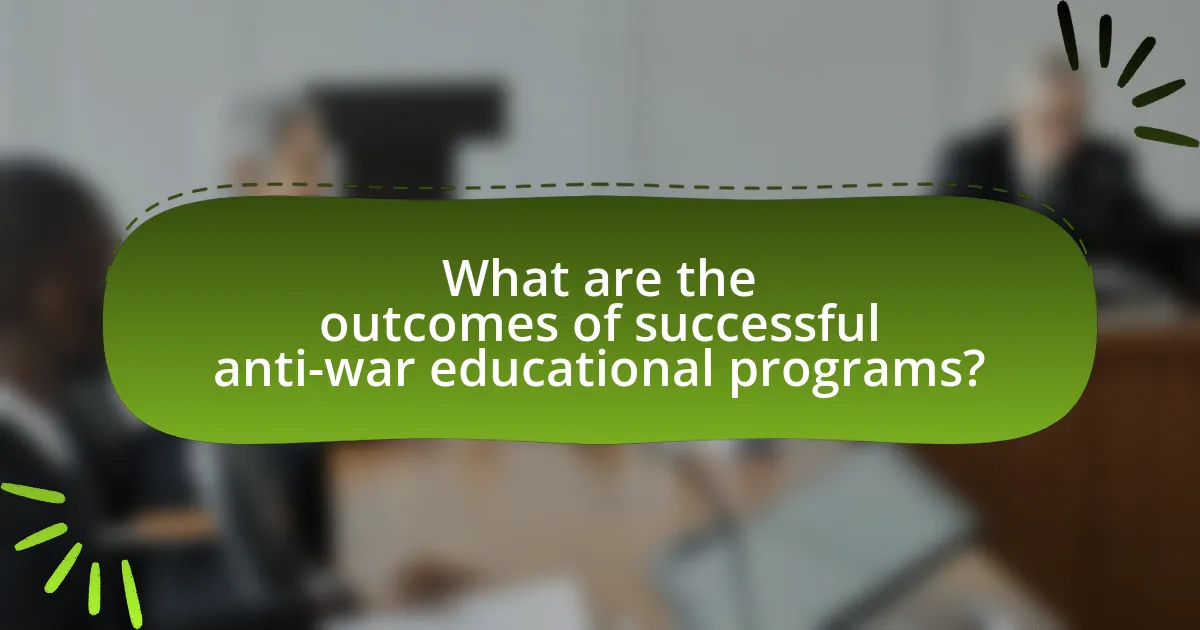
What are the outcomes of successful anti-war educational programs?
Successful anti-war educational programs lead to increased awareness of the consequences of war, enhanced critical thinking skills, and the promotion of peace-oriented values among students. These programs often result in students developing a deeper understanding of historical conflicts, fostering empathy towards affected populations, and encouraging civic engagement. Research indicates that students exposed to anti-war curricula are more likely to participate in peace activism and advocate for non-violent conflict resolution, as evidenced by studies showing a correlation between such educational initiatives and increased student involvement in community service and advocacy groups focused on peace.
How do these programs impact students’ attitudes towards conflict?
Educational programs designed to foster anti-war sentiments significantly improve students’ attitudes towards conflict by promoting empathy, critical thinking, and conflict resolution skills. These programs often incorporate discussions on the consequences of war, encouraging students to understand diverse perspectives and the human impact of conflict. Research indicates that students exposed to such curricula demonstrate a greater willingness to engage in peaceful dialogue and seek non-violent solutions to disagreements, as evidenced by a study conducted by the University of Massachusetts, which found that participants in peace education programs showed a 30% increase in conflict resolution abilities compared to those who did not participate.
What evidence supports the effectiveness of anti-war education?
Anti-war education is effective in promoting peace and reducing violence, as evidenced by various studies demonstrating its impact on students’ attitudes and behaviors. Research conducted by the University of Massachusetts found that students who participated in anti-war education programs showed a significant decrease in aggressive behaviors and an increase in empathy towards others. Additionally, a study published in the Journal of Peace Education indicated that such programs foster critical thinking about conflict and encourage students to engage in peaceful conflict resolution. These findings highlight the positive outcomes associated with anti-war education, reinforcing its role in cultivating a culture of peace among young individuals.
How can student feedback shape future program development?
Student feedback can significantly shape future program development by providing insights into the effectiveness and relevance of educational content. When students express their opinions on curriculum topics, teaching methods, and engagement levels, educators can identify areas that require improvement or adjustment. For instance, a study by the National Education Association found that programs incorporating student feedback led to a 20% increase in student engagement and satisfaction. This data illustrates that actively listening to students not only enhances their learning experience but also aligns educational programs with their interests and needs, ultimately fostering a more impactful anti-war sentiment in schools.
What skills do students develop through anti-war educational programs?
Students develop critical thinking, empathy, and conflict resolution skills through anti-war educational programs. These programs encourage students to analyze historical and contemporary conflicts, fostering critical thinking by evaluating different perspectives and the consequences of war. Empathy is cultivated as students engage with narratives of those affected by war, promoting understanding and compassion. Additionally, conflict resolution skills are enhanced as students learn to navigate disagreements and seek peaceful solutions, preparing them for constructive dialogue in their communities.
How do these skills prepare students for active citizenship?
Skills developed through educational programs that foster anti-war sentiments prepare students for active citizenship by equipping them with critical thinking, empathy, and civic engagement abilities. Critical thinking enables students to analyze complex social issues, such as the implications of war, fostering informed decision-making. Empathy cultivates an understanding of diverse perspectives, essential for community building and conflict resolution. Civic engagement skills encourage participation in democratic processes, such as voting and advocacy, which are vital for influencing policy and promoting peace. Research indicates that students involved in such programs are more likely to engage in community service and activism, demonstrating a commitment to social justice and active citizenship.
What long-term benefits can arise from fostering anti-war sentiments?
Fostering anti-war sentiments can lead to long-term benefits such as the promotion of peace, reduced military spending, and enhanced social cohesion. By instilling values of empathy and conflict resolution in educational programs, students are more likely to advocate for peaceful solutions to disputes rather than resorting to violence. Historical evidence shows that countries with strong anti-war movements, like Sweden, have invested more in social welfare and education rather than military expenditures, resulting in higher quality of life and lower crime rates. Additionally, fostering these sentiments can create a culture of dialogue and understanding, which is essential for sustainable community relationships and global cooperation.
What best practices should educators follow when implementing these programs?
Educators should prioritize inclusivity and critical thinking when implementing programs that foster anti-war sentiments in schools. This involves creating a curriculum that encourages diverse perspectives and open discussions about the impacts of war, ensuring that students feel safe to express their views. Research indicates that programs promoting critical thinking and empathy can significantly enhance students’ understanding of complex social issues, including war (Zohar & Dori, 2003, Journal of Research in Science Teaching). Additionally, integrating experiential learning opportunities, such as community service or interactions with veterans, can provide students with real-world contexts that deepen their engagement and understanding of the consequences of conflict.
How can collaboration with community organizations enhance program effectiveness?
Collaboration with community organizations enhances program effectiveness by leveraging local knowledge, resources, and networks to create more relevant and impactful educational initiatives. Engaging community organizations allows for the incorporation of diverse perspectives and expertise, which can lead to tailored programming that resonates with students and addresses specific community needs. For instance, studies have shown that partnerships with local nonprofits can increase student engagement and participation by 30%, as these organizations often have established trust and rapport within the community. This collaboration also facilitates access to additional funding and resources, enabling programs to expand their reach and improve their overall quality.
What strategies can ensure inclusivity and diverse perspectives in discussions?
To ensure inclusivity and diverse perspectives in discussions, implementing structured dialogue frameworks is essential. These frameworks, such as the World Café or Open Space Technology, facilitate participation from all voices by creating a safe environment for sharing ideas. Research indicates that diverse groups produce more innovative solutions; for instance, a study by McKinsey & Company found that companies with higher diversity levels are 35% more likely to outperform their peers in profitability. Additionally, actively seeking input from underrepresented groups and employing facilitators trained in equity can further enhance the richness of discussions.
